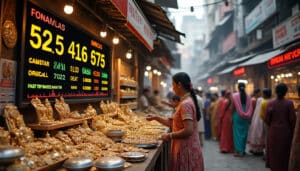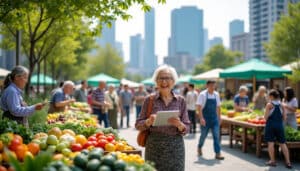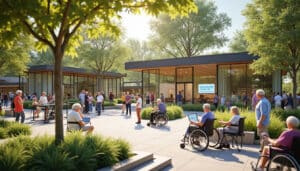“`html
The aging population is redefining the contours of our society. In Europe and China, the challenges related to a growing senior population are driving major innovations. These transformations profoundly influence economic and social policies.
In the face of this evolution, the silver economy positions itself as an essential lever to meet the needs of seniors. The European Union is observing a significant increase in people over 65 years old, necessitating adapted infrastructures and dedicated services. In China, the rise of this economy is energizing the cultural tourism and health services sectors. These dynamics testify to a profound societal change, opening the door to new opportunities and strategies.
The aging population in China: a major demographic challenge
China is facing an unprecedented demographic transformation with an aging population in full expansion. According to the latest data, more than 35% of the population will be 60 years old or older by 2050, marking a dramatic increase compared to previous decades. This phenomenon, often referred to as aging of the population, poses a colossal challenge for the country, both socially and economically. The decrease in the number of people of working age highlights the need to rethink retirement policies, health systems, and social infrastructures.
Furthermore, demographic aging influences various sectors, including the silver economy. This term encompasses all economic activities related to the specific needs of seniors, ranging from health services to adapted leisure activities. In China, this economy is booming, driven by an increasingly active population eager to maintain a high quality of life. However, this transition is not without obstacles. Current infrastructures must adapt to meet new demands, and investments in innovative technologies are essential to ensure effective and respectful care for the elderly.
The rise of the silver economy: definition and implications
The silver economy represents a major economic opportunity, leveraging the increasing purchasing power of seniors. It encompasses a variety of sectors, including senior tourism, health, technology, and leisure services. In China, this economy is developing rapidly, supported by an aging population and an increase in life expectancy. Companies are adapting their offerings to meet the specific needs of this demographic, thereby creating new markets and specialized jobs.
A crucial aspect of this economy is the integration of advanced technologies to improve the quality of life for seniors. Innovations such as connected health devices, assisted mobility solutions, and dedicated communication platforms allow the elderly to remain active and engaged in society. Furthermore, the silver economy also contributes to the development of cultural tourism, offering destinations and activities tailored to the interests and abilities of older adults.
According to a report from China Daily, the silver economy in China holds a promising potential with projections of significant growth in the coming years. This growth is supported by government policies aimed at encouraging innovation and strengthening infrastructures dedicated to seniors. However, to maximize the benefits of this economy, it is essential to continue investing in research and development, as well as in the training of specialized professionals.
Poetry as a cultural expression among seniors
Poetry emerges as a valued form of cultural expression among the elderly in China. This art allows seniors to share their experiences, memories, and emotions, thereby creating an intergenerational link and reinforcing the social fabric. Participating in poetry workshops or reading literary works becomes a regular activity that enriches the daily lives of the elderly while stimulating their creative minds.
Community initiatives and cultural centers play a key role in promoting poetry among seniors. These spaces offer a conducive environment for artistic expression, encouraging social interactions and the sharing of knowledge. Additionally, poetry contributes to improving the mental health and well-being of seniors, providing a means to manage stress and prevent social isolation.
Moreover, poetry can also serve as a catalyst for the development of educational and recreational programs dedicated to seniors. By integrating reading and poetic writing activities into the silver economy, businesses and institutions can create products and services that meet the cultural and intellectual needs of this population.
Remote destinations: a growing trend among seniors
The attraction to remote destinations among the elderly in China is on the rise. With the growth of the silver economy, many seniors now have the resources necessary to travel and explore new horizons. This trend is fueled by several factors, including improved transportation infrastructures, diversified tourist offerings, and the desire of seniors to remain active and engaged.
Travel agencies are adapting their services to meet the specific needs of seniors, offering personalized itineraries, suitable accommodations, and enriching cultural activities. Organized trips are becoming increasingly popular, allowing seniors to discover remote destinations safely and comfortably. Moreover, the destinations themselves are striving to create welcoming and accessible environments for older visitors, thus fostering a pleasant and memorable travel experience.
This dynamic also has a positive impact on the local economy of tourist destinations, generating additional revenue and stimulating employment. Furthermore, senior tourism contributes to the preservation and promotion of cultural heritage, as seniors show a particular interest in historical sites and local traditions. By investing in suitable tourist infrastructures, China can capitalize on this trend and strengthen its position in the global tourism market.
Impact on the tourism and hospitality sector
The rise of the silver economy is profoundly transforming the tourism and hospitality sector in China. Companies in this field are adapting their offerings to meet the specific needs of seniors, emphasizing comfort, accessibility, and the provision of enriching cultural activities. This adaptation includes the creation of suitable rooms, on-site medical services, and recreational programs specially designed for the elderly.
Moreover, tourist destinations are investing in training their staff to better understand and serve the senior market. This results in improved service quality and increased satisfaction among older clients. Hotels and resorts are also collaborating with specialized agencies to offer tailor-made packages, integrating cultural excursions, creative leisure workshops, and wellness services.
According to a study published on The Silver Business, this market segment contributes significantly to the economic growth of the tourism sector. By offering unique and tailored experiences, companies can attract a loyal clientele and contribute to the diversification of the national tourism offer. Furthermore, the integration of innovative technologies, such as travel applications dedicated to seniors, facilitates travel planning and management, making the experience even more enjoyable and accessible.
Political initiatives to support the silver economy
To accompany the aging of the population, the Chinese government has implemented several initiatives aimed at supporting and stimulating the silver economy. These policies encompass financial support measures, tax incentives, and vocational training programs designed to encourage businesses to invest in senior-related sectors.
Among these initiatives are improvements to the care system and the stimulation of the silver economy. Policy advisors are actively working to establish health structures better suited to the needs of the elderly, including modern geriatric centers and home care services. These efforts aim to ensure quality care while reducing costs for families and the state.
Additionally, awareness campaigns and educational programs are launched to promote entrepreneurship in the silver economy sector. By encouraging young entrepreneurs to develop innovative solutions for seniors, the government facilitates the emergence of new businesses and fosters the creation of specialized jobs. These initiatives help stimulate the market and ensure sustainable growth of the silver economy in China.
In parallel, public-private partnerships are established to support projects related to seniors, particularly in the fields of technology, tourism, and health. These collaborations allow for resource pooling and accelerate the development of adapted services and products, thereby enhancing China’s competitiveness in the global silver economy market.
Economic opportunities related to this demographic evolution
The increase in the elderly population in China paves the way for numerous economic opportunities across various sectors. The silver economy represents a lucrative market, attracting significant investments in health, well-being, tourism, and financial services. Businesses that can anticipate and meet the needs of seniors will benefit from sustained growth and increased customer loyalty.
One of the main levers of this economy is senior tourism, which is rapidly developing due to a growing demand for tailored and enriching travel experiences. Tourist destinations are investing in specific infrastructures, such as accessible hotels and targeted cultural activities, to appeal to this demanding clientele. Moreover, the development of innovative technologies facilitates the planning and execution of trips, making the experience more pleasant and secure for seniors.
Furthermore, the health sector also benefits from this demographic evolution, with an increased demand for specialized care services and advanced medical technologies. Companies are investing in the research and development of connected health solutions, enabling better management of chronic illnesses and effective care for the needs of seniors. Additionally, the market for wellness products, including adapted fitness equipment and rehabilitation programs, is also experiencing notable expansion.
The silver economy is also driving innovation in the field of financial services, with a growing demand for tailored savings and retirement products. Banks and financial institutions are developing personalized solutions that meet the specific needs of seniors regarding wealth management and retirement planning. These innovations help strengthen the financial stability of the elderly while creating new revenue sources for companies in the sector.
In summary, the demographic evolution in China creates a favorable environment for the rise of the silver economy, offering diverse and promising opportunities for entrepreneurs and investors. By capitalizing on this trend, China can not only meet the needs of its aging population but also consolidate its economic position on the global stage.
Contribution of the silver economy to cultural and senior tourism
The silver economy plays a crucial role in the development of cultural tourism in China, specifically targeting the needs and interests of seniors. This synergy between the silver economy and cultural tourism creates unique opportunities to promote local heritage and traditions while meeting the expectations of older travelers. Tourist destinations integrate enriching cultural activities, such as guided tours of historical sites, traditional craft workshops, and gastronomic discovery programs tailored for seniors.
Tourist infrastructures are also adapting to offer optimal comfort for seniors, with accessible accommodations, suitable transportation, and personalized services. For example, hotels offer rooms specially designed for individuals with reduced mobility, while travel agencies provide flexible itineraries and concierge services to facilitate movements. These adjustments allow seniors to fully enjoy their tourist experience while ensuring their safety and well-being.
Moreover, the silver economy encourages the creation of training programs for tourism professionals, raising their awareness of the specific needs of seniors and equipping them with the necessary skills to provide quality service. This training helps to enhance the experience of elderly travelers, thereby reinforcing China’s reputation as a welcoming and inclusive tourist destination.
A concrete example of this contribution is the initiative taken by certain regions to promote cultural tourism adapted for seniors. These initiatives include dedicated cultural festivals, adapted hiking trails, and artistic events designed to encourage active participation of seniors. By promoting cultural heritage through an approach centered on seniors, the silver economy contributes to the preservation and transmission of local traditions while stimulating the tourism sector.
…







